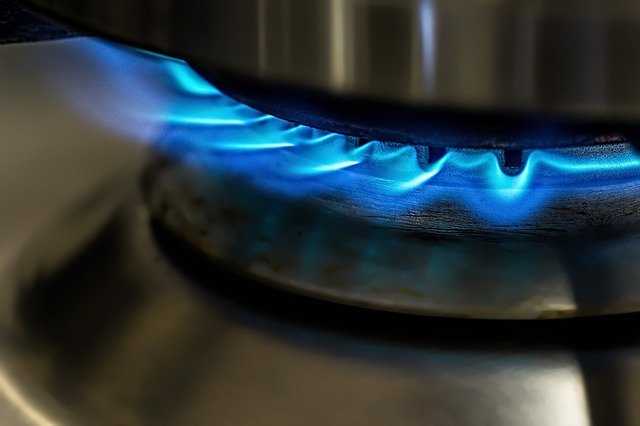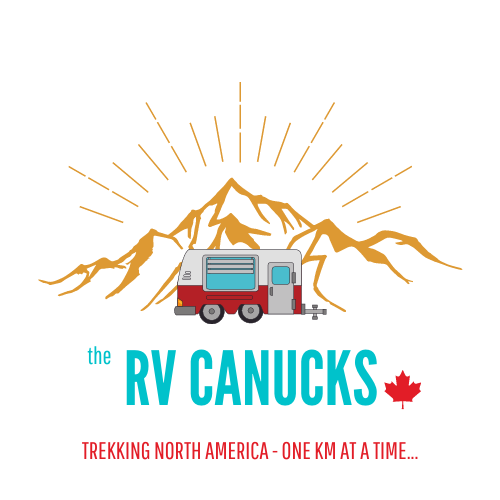5 RV Propane Tips That Save Time and Money | Ep. 20

I am Melina, of the RV Canucks and I am flying solo this week, as Dan is away. This week, we are offering another of our quick tip series, and this one is all about quick and easy RV propane tips to save you time and money.
1. How to tell how full your tanks are without gadgets
You can tell how full your propane tanks are in a little time as it takes to boil water. No lifting of the tanks and guestimating the weight, and no gadgets required.
Simply boil some water and pout over the side of your propane tanks, and then run your hand over the tank. Where the tank goes from hot to cold, that is the level of the propane inside your tank.
There are gadgets and apps you can use to determine how full your tanks are, but we tend to use this easy method as it fits with our “less is more” camping philosophy. That said, for those interested in going the gadget route, here’s some links to popular products you can check out.
2. Know How long your tanks will last
Of course, answering this question is like asking how many drops there are in the ocean, because there’s several variables that affect how long propane will last, most importantly, what your using it for and how much, but – armed with some basic calculations, you can pretty accurately estimate propane usage specific to your RV or travel trailer.
First, know the size of tank you have, and how many tanks your rig is equipped with. The two common tank sizes are 20 and 30 lb tanks.
- A 20lb tank contains 432,000 BTU hours of propane
- A 30 lb tanks contains 650,000 BTU hours of propane
Our trailer is equipped with 2 30lb tanks. So at full capacity we have 1,300,000 BTU hours of propane combined. That may sound like a lot, but when you have an appliance that is capable of pulling 30,000 or more BTU every hour or more, it can get eaten up pretty quick.
Here’s some simple approximations you can make, however to figure out usage specific to your rig:
The basic rule of thumb for RV furnaces is that you can expect your furnace to use 1,000 BTU hours for each linear foot of living space. So our trailer, being 30 feet, has a 30,000 BTU furnace.
A typical sized 10-12 Cu ft LP fridge will only use about 1,400 BTU per hour
A 6 gallon propane water heater uses approximately 8-10,000 BTU and takes approximately 45 minutes to reheat
Most RV stovetop burners are 6,500 BTU
The important thing is to remember that your 30,000 BTU furnace isn’t going to be running all the time without shutting off (or it may not be used at all in the middle of the summer) so knowing how often you expect your appliances to cycle on and off is key to estimating how long you can go between fills.
So let’s look at an extreme calculation I made for our trailer, for cooler weather, where we might be showering and can expect the furnace to cycle on for about 20 minutes each hour.
6,000 BTU (20 min cycle)
8,800 BTU Water Heater – Reheat once ever 2 hours
1,400 BTU Fridge
550 BTU – 2 hours total cook time on burner
16,750 Total
Remember, we have 30 lb tanks, and each has a capacity of 650,000 BTU hours, so:
650,000 / 16, 750 = 38.8 hours x 2 tanks = 77.5 hours of propane (3.25 days)
Now keep in mind, this is an extreme option. We wouldn’t generally come close to using that much hot water, and the furnace would rarely run that much, but it demonstrates the math.
We didn’t even go through one tank on our entire 26 day Route 66 trip, because it was the summer and we had plenty of shore power to go around. In fact. I still think we’re working on the last of the reserve tank from that trip, and this is 2 years later.
3. Easy Ways to Reduce Propane Usage
- Tips to reduce usage
- Use your electric water heater if equipped
- If no shore power, only turn on the water heater shortly before you want to use it, and then turn it off when done
- Go old-school and heat water over the fire or burner for washing dishes
- Use a separate camp stove, BBQ, or the good old fire pit to do your cooking and take some load off the big tanks
- Consider a small space heater if connected to shore power to reduce the furnace usage, which is undoubtedly the biggest energy suck for your rig. Just be sure not to leave it unattended.
4. Know how colder weather affects propane
It’s important to know that when the temperature outside is extremely cold. Zero and below, your BTU hourly capacity can be reduced by 50% or more because propane vapour actually shrinks with the cold, so that’s something to keep in mind when the mercury dips low.
5. Beware the automatic changeover valve
Automatic changeover valves can be a great tool to ensure you aren’t waking up with icicles on your body because the propane went out in the middle of the night, however having this convenience can cause you to overlook an important fact that could leave you with no propane at all.
Automatic changeover valves are hooked up to both tanks with a lever in the middle that gets pointed to either the left or right tank. Both tank valves are kept open, and the valve automatically begins to draw from the reserve tank when it senses that the first one is full.
Because many of these valves are low-tech, it can be easy to overlook, or forget that the tank has switched over, and by the time you realize your rig has gone cold, you’ve depleted both tanks.
It is this reason, we choose to manually operate our tanks, especially if we’re in a location where propane refills will be hard to come by.
And here’s my special bonus tip, which I can say to you all because Dan is not here today: To make middle of the night propane changeover easy if and when it happens, make your spouse sleep closest to the door, because it’s pretty much camping law, that he (or she) who sleeps closest to the door, has to switch the propane.
And with that little tip – we’re taking a podcasting break until after the holidays.
On behalf of Dan and I we cannot tell you how thrilled we are that you tune in every week to the RV Canucks, and we would like to take this moment to thank you for making our first year as podcasters a blast, and interacting with us on Instagram and facebook and giving us some pretty amazing reviews on Apple Podcasts. We’re working on some pretty exciting shows, and one great, big, exciting roadtrip for 2021, so buckle up and get ready to ride.
With all our blessings for a safe and happy holidays, even in the dumpster fire of 2020, we wish peace for you and your families and we’ll see you next year! And, if you want to give us a gift this year, we would really appreciate you telling your camping and RVing friends and family about us, we’d love to have them along for the ride.
About The Author
Related Posts
Backwoods Nutrition with Terri Ney | Ep. 35
Today, we’re joined by Terri Ney to talk about Nutrition, how to pack…
RV Fact or Fiction: Pest Control Edition | Ep 32
RV Pest Control Today, on episode 32, we’re diving into our first ever RV…
Error: API requests are being delayed for this account. New posts will not be retrieved.
There may be an issue with the Instagram access token that you are using. Your server might also be unable to connect to Instagram at this time.




